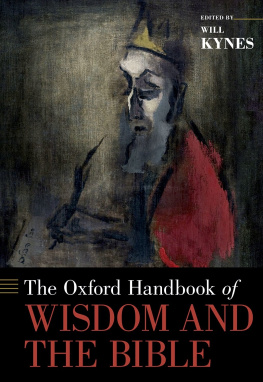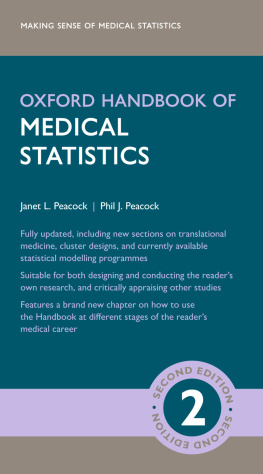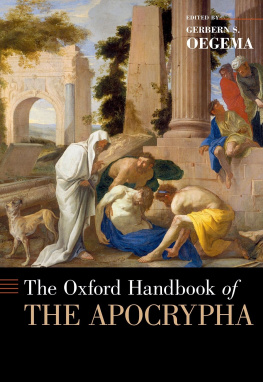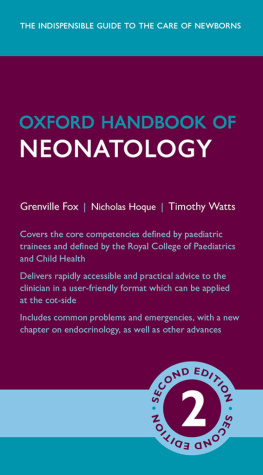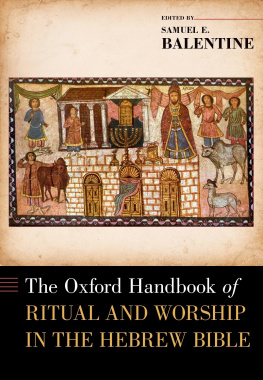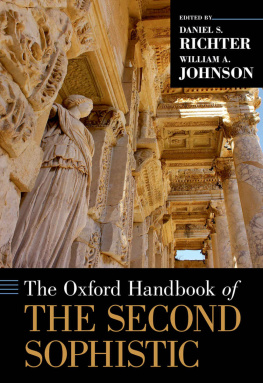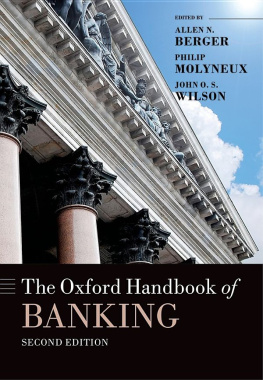Will Kynes - The Oxford Handbook of Wisdom and the Bible
Here you can read online Will Kynes - The Oxford Handbook of Wisdom and the Bible full text of the book (entire story) in english for free. Download pdf and epub, get meaning, cover and reviews about this ebook. year: 2020, publisher: Oxford University Press USA, genre: Religion. Description of the work, (preface) as well as reviews are available. Best literature library LitArk.com created for fans of good reading and offers a wide selection of genres:
Romance novel
Science fiction
Adventure
Detective
Science
History
Home and family
Prose
Art
Politics
Computer
Non-fiction
Religion
Business
Children
Humor
Choose a favorite category and find really read worthwhile books. Enjoy immersion in the world of imagination, feel the emotions of the characters or learn something new for yourself, make an fascinating discovery.
- Book:The Oxford Handbook of Wisdom and the Bible
- Author:
- Publisher:Oxford University Press USA
- Genre:
- Year:2020
- Rating:3 / 5
- Favourites:Add to favourites
- Your mark:
- 60
- 1
- 2
- 3
- 4
- 5
The Oxford Handbook of Wisdom and the Bible: summary, description and annotation
We offer to read an annotation, description, summary or preface (depends on what the author of the book "The Oxford Handbook of Wisdom and the Bible" wrote himself). If you haven't found the necessary information about the book — write in the comments, we will try to find it.
The Oxford Handbook of Wisdom and the Bible — read online for free the complete book (whole text) full work
Below is the text of the book, divided by pages. System saving the place of the last page read, allows you to conveniently read the book "The Oxford Handbook of Wisdom and the Bible" online for free, without having to search again every time where you left off. Put a bookmark, and you can go to the page where you finished reading at any time.
Font size:
Interval:
Bookmark:


Oxford University Press is a department of the University of Oxford. It furthers the Universitys objective of excellence in research, scholarship, and education by publishing worldwide. Oxford is a registered trade mark of Oxford University Press in the UK and certain other countries.
Published in the United States of America by Oxford University Press
198 Madison Avenue, New York, NY 10016, United States of America.
Oxford University Press 2021
All rights reserved. No part of this publication may be reproduced, stored in a retrieval system, or transmitted, in any form or by any means, without the prior permission in writing of Oxford University Press, or as expressly permitted by law, by license, or under terms agreed with the appropriate reproduction rights organization. Inquiries concerning reproduction outside the scope of the above should be sent to the Rights Department, Oxford University Press, at the address above.
You must not circulate this work in any other form and you must impose this same condition on any acquirer.
Library of Congress Cataloging-in-Publication Data
Names: Kynes, Will, 1981 editor.
Title: The Oxford handbook of wisdom and the Bible / edited by Will Kynes.
Description: New York, NY : Oxford University Press, [2021] | Includes bibliographical references.
Identifiers: LCCN 2020035227 (print) | LCCN 2020035228 (ebook) | ISBN 9780190661267 (hardback) | ISBN 9780190661281 (epub) | ISBN 9780190661298 (ebook)
Subjects: LCSH: Wisdom literatureCriticism, interpretation, etc. | WisdomReligious aspects. | WisdomBiblical teaching.
Classification: LCC BS1455.O94 2021 (print) | LCC BS1455 (ebook) | DDC 223/.06dc23
LC record available at https://lccn.loc.gov/2020035227
LC ebook record available at https://lccn.loc.gov/2020035228
1 3 5 7 9 8 6 4 2
Printed by Sheridan Books, Inc., United States of America
To Vanessa,
who has embodied the delightful blessings of wisdom in my life.
Get wisdom; get insight: do not forget, nor turn away
from the words of my mouth.
Do not forsake her, and she will keep you;
love her, and she will guard you.
The beginning of wisdom is this: Get wisdom,
and whatever else you get, get insight.
Prize her highly, and she will exalt you;
she will honor you if you embrace her.
She will place on your head a fair garland;
she will bestow on you a beautiful crown.
Proverbs 4:59
The concept of wisdom holds a prominent place in the social and theological imagination of the biblical authors. Wisdom is presented as one of Gods defining characteristics (Isa 31:2; Job 12:13; cf. Rom 16:27), present with the deity at creation (Prov 3:19; 8:2731), the product of obedience to the Torah (Deut 4:6; Ps 119:98), and a divine gift (Prov 2:6; Jas 1:5). It is identified with the fear of the Lord (Prov 1:7; 9:10; Job 28:28; Ps 111:10), righteousness (e.g., Prov 10:31), and life (Prov 13:14), as well as with skill in practical matters, such as spinning yarn (Exod 35:25), sailing ships (Ezek 27:8), proper speech (Prov 12:18; 29:11), and amassing wealth (Ezek 28:4; Prov 8:18). The wise, those who possess wisdom in special measure, are respected for their just judgments (1 Kgs 3:28) and insightful counsel (Jer 18:18). In the New Testament, wisdom is associated with Christ (1 Cor 1:24, 30), and is one of the attributes for which he receives eternal worship (Rev 5:12). The Christian community is expected to be characterized by its own distinctive wisdom (Jas 3:13, 17), different from that of the Greeks (1 Cor 1:2225).
Within biblical scholarship, the discussion of wisdom and the Bible has been primarily oriented around Wisdom Literature as a category of biblical texts centered around Proverbs, Ecclesiastes, and Job, though sometimes including Psalms and Song of Songs, as well as Sirach and Wisdom of Solomon, and even spreading its influence into additional texts across the canon. These texts have been associated with a group called the wise in the Hebrew Bible, who are credited with promulgating a Wisdom tradition, with its own distinct theological beliefs and literary forms of expression. Therefore, this volume includes chapters on features of Wisdom Literature as a category (Part IV), its relationship to other types of literature in the Hebrew Bible and Second Temple period (Part V), and each of the texts commonly associated with it (Part VI).
However, as becomes evident in a number of these chapters (especially those in Part V), a focus on Wisdom Literature as a category will leave features of the biblical conception of wisdom in the blurry periphery of our vision. The field is currently in the midst of a spirited debate about the value and validity of this category. Oxford Handbooks are designed both to reflect the current state of the discipline and to help shape its future. That makes this an ideal forum in which to carry out this debate. Contributors to this volume represent the full range of opinions on the future of Wisdom Literature, from those who think it should be discarded as a distorting hindrance to the accurate interpretation of the biblical texts associated with it and the concept of wisdom it purports to illuminate, to those who would maintain it for its heuristic value as the encapsulation of distinct features the texts share and a window into the social world behind them.
This volume is not designed to take a particular position in this debate, but it does take advantage of the space the new questions being raised about the Wisdom category has created to think anew about wisdom as a concept. As the introductory chapter explains, the study of Wisdom Literature does not completely comprehend the study of wisdom as a concept in the Bible and related cultures, and yet concept and category remain intertwined, such that their treatment in a common volume is fitting.
Therefore, the first half of the volume focuses on wisdom as a concept. As interpreters have attempted to describe this jewel of biblical thought, they have focused attention on several of its glimmering facets: wisdoms association with skill and success in its advice, its connection to knowledge and revelation in its epistemology, its role in character formation as a virtue, its ligature with creation and covenant in its theology, and its encapsulation of retribution and skepticism in its vision of order. Part I of this volume considers each in turn.
A concept of such significance cannot be understood simply within the constraints of the biblical canon. Part II examines how, dropped into an ancient world already awash with reflection on wisdom, the biblical conception ripples through cultures shaped by the Hebrew Bible. Part III, then, explores the continuing relevance of wisdom in the modern world, both in the three Religions of the Book Islam, Judaism, and Christianity, and in a sampling of ideological and contextual perspectives. As in the second half of the volume focused on Wisdom Literature as a category, the contributors who reflect on wisdom as a concept in the three parts in this first half represent a range of views on the validity of the Wisdom category and therefore its value for illuminating the biblical concept of wisdom. Wisdom and Wisdom Literature no longer dance in quite as tight an embrace; how wisdoms steps may change if no longer led by Wisdom Literature and whether Wisdom Literature will even remain on the floor still remain to be seen.
Font size:
Interval:
Bookmark:
Similar books «The Oxford Handbook of Wisdom and the Bible»
Look at similar books to The Oxford Handbook of Wisdom and the Bible. We have selected literature similar in name and meaning in the hope of providing readers with more options to find new, interesting, not yet read works.
Discussion, reviews of the book The Oxford Handbook of Wisdom and the Bible and just readers' own opinions. Leave your comments, write what you think about the work, its meaning or the main characters. Specify what exactly you liked and what you didn't like, and why you think so.

